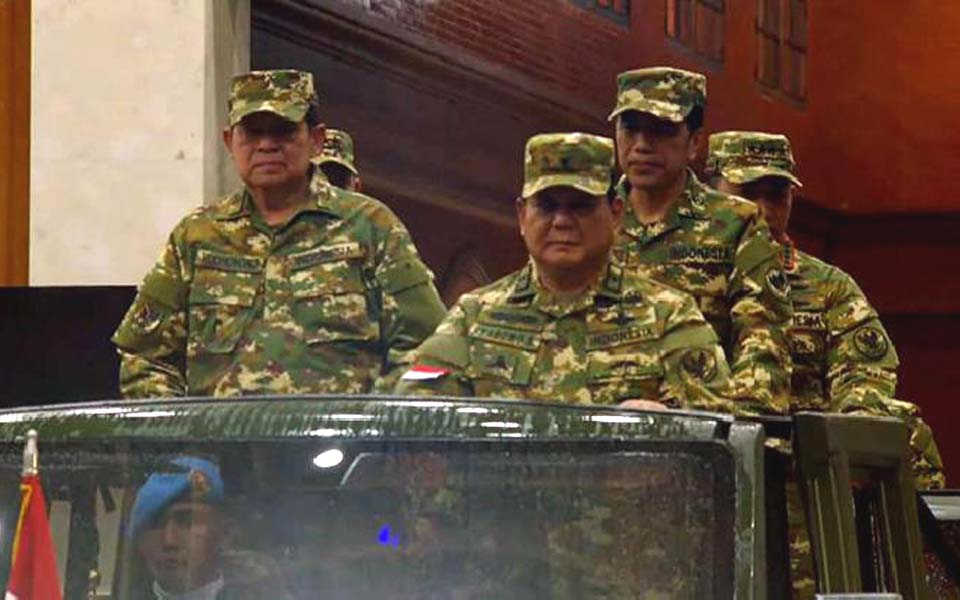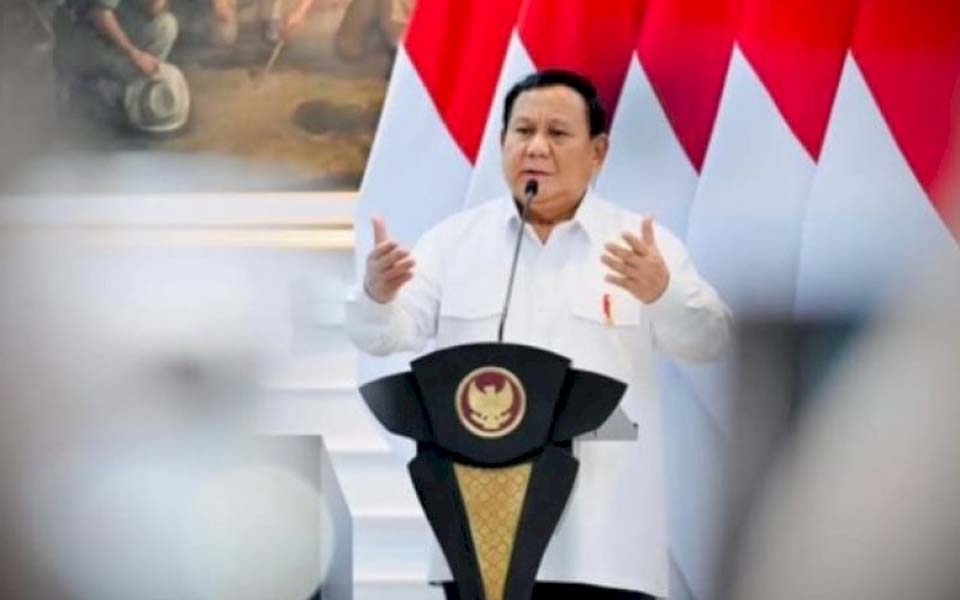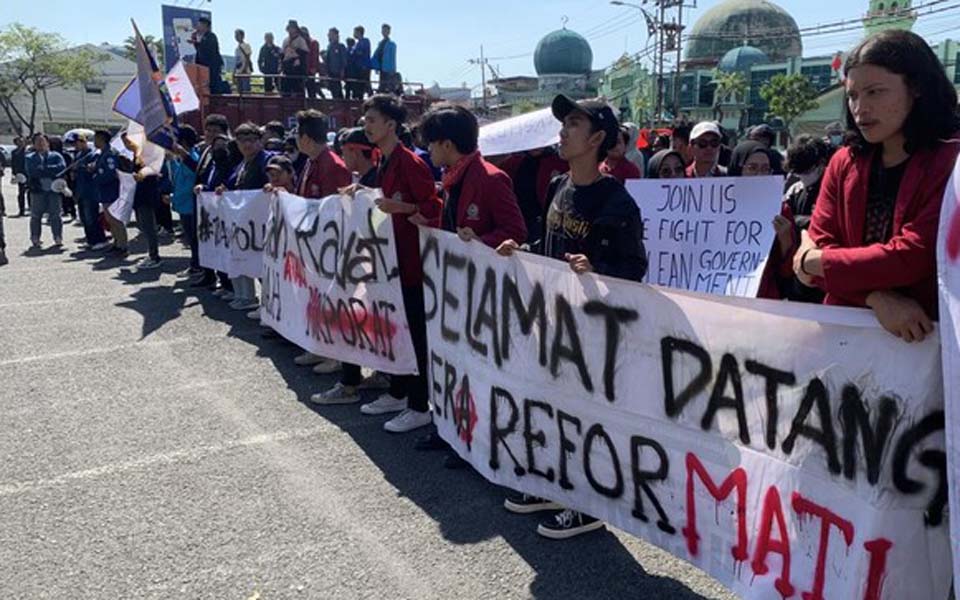Welcome back to New Perspectives (Perspektif Baru), I’m Jaleswari Pramodhawardani and I’m here with Zely Ariane, an activist from the Perempuan Mahardhika National Network. Today we will be speaking about an issue that is of concern to us all, the urban poor.
We have all been shocked by the huge jump in cooking oil prices as well as the scarcity of milk on the market. It began in 2005 with the fuel prices increases and so forth, then the National Statistics Agency released figures that we thought were quite significant, that is on the percentage of people in Indonesia living in poverty, which totals around 40 percent.
Rather than discussing the number of poor, we will be discussing something more concrete and I think that Zely is the most competent person to talk about the issue of poverty. At least in terms of the Poor Peoples Struggle Coordinating Posts (POPRAM) that she has been working with.
The following is an interview between Jaleswari Pramodhawardani and Zely Ariane.
I would be interested to hear some anecdotes or some brief information about you. Since 2003 you have been involved with issues concerning the poor, women and activists in various organisations such as the Perempuan Mahardhika National Network (JNPM). Perhaps you could tell us a little about this.
I’m from the Perempuan Mahardhika National Network. JNPM is a coalition for women who are already involved in a mass organisation, but it also represents women who are not part of an organisation, but essentially it is mostly about empowering the consciousness of women in order that they can become more independent, political and understand what is taking place around them, and what impact this has upon them.
Who can join?
Anyone can join, civil servants, teachers, doctors, even journalists, we also network with the Alliance of Independent Journalists, individuals and the like.
What is the main focus of its activities?
Currently we are focusing on the empowerment of women from the urban poor. Because as it happens, the ones who are most active in the women’s struggle at the moment are in fact housewives from urban poor communities. It turns out that it is wrong for us to view women as inconsequential, particularly women who are poor, that they had no power. On the ground, under conditions that are becoming more difficult, it is precisely women of limited means in the group that are playing an increasingly useful role.
What survival strategy is being put forward for poor households?
Yes. Particularly so that they understand their rights, then to take action to address what can be done to improve their future.
What is the focus of the programs to empower these urban poor households?
Concretely what we have been doing is handling healthcare advocacy, before we were dealing with advocacy for Direct Cash Assistance (BLT) and Raskin (cheap rice program, rice for the poor). More recently it has been Gakin (welfare cards for poor households) and Askeskin (health insurance for the poor), as means to obtain free health services at hospitals working jointly with the government.
What is the difference between Askes (state-owned health insurance company), Gakin and Askeskin?
With Askes you have to pay a premium, which is deducted from each month’s wage, while Gakin or Askeskin is different. Gakin and Askeskin are provided by the government to poor communities with very low incomes so that they can obtain access to free health services. In advanced countries there is actually no differentiation between free health services, services are valid for all social layers, however in Indonesia this is still the case.
Exactly what issue are you taking up, because the general view, right, is that if it’s free it means different services?
In practice it is indeed different. With Gakin or Askeskin the medicines provided are generic drugs. Although research has demonstrated that generic drugs are not poor quality drugs, this already represents a differentiation of those people being treated with ordinary drugs or through Askes. And the services are different, in the hospitals there are special Gakin and Askeskin service counter. And even then it’s not easy to obtain services, even if you already have a card it doesn’t automatically mean that everything becomes free, hospitals usually come up with particular reasons to make things difficult, which we often find ourselves fighting against, because everything should be free for Gakin and Askeskin card holders, so poor communities are not afforded their rights. That’s also discrimination.
Do they actually understand these rights?
The most recent experience, about a week ago, was an appeal or instruction from the Jakarta healthcare office about a program to produce 6,000 cards for poor families.
Why only 6,000, there are much more than 6,000 poor people [in Jakarta]?
There was no explanation, but okay we went ahead with this figure of 6,000. We explained it to residents, go ahead and apply for a card, go to the RT (neighborhood association), the RW (community unit), the Kelurahan (political district administered by a village chief), the Puskesmas (community healthcare centre) for verification and so on. But even at the level of the RT there were obstacles, they said, we didn’t know there was an instruction for 6,000 cards, or that we had to pay and so on. There were huge obstacles, from just this one example, it turned out that a program that should have been a good one, become one that was not implemented properly because there was inadequate socialisation, the funds were too small and there were deductions here then deductions there, at various levels of the bureaucracy, so for residents it was less than effective.
How do you go about obtaining a card?
First you go to the RT and RW to get a document certifying that a family is entitled to government assistance (SKTM). The RT should already know what has to be done. Later the RT verifies it. Then it’s taken care of again at the RW, then the Kelurahan. The Kelurahan provides a reference letter certifying that the applicant is poor. Then they are given a letter for the Puskesmas, so there are two stages in the verification. A verification through government administrative channels, in this case the RT, RW and Kelurahan, then verification through the healthcare office, in this case the Puskesmas.
What is verified?
They look at the living conditions of the poor, a kind of survey. This is a big problem, because the indicators used to measure poverty make absolutely no sense. Actually they have several views of what is categorised as poor. If it is from the World Bank it’s clear, if their daily income is under US$2 or 19,000 rupiah a day they are poor. Now, in Indonesia its not like that, there are all kinds of categories. Aside from an income of less then 200,000 rupiah a month, there are 14 other criteria such as do you own a small house, is the floor tiled; if you have to use public bathing, washing and toilet facilities but own an electric fan, then you are not included as poor. So it’s a big problem.
I think that this is a problem inherited from earlier times right, if we talk about the IDT (a presidential instruction on a program for least developed villages) the criteria is also rather “foolish”. If this criteria is agreed to we should obtain a card, right? It should be like that, moreover we shouldn’t need to because it is the responsibility of the RT.
What do you think is the main problem on the ground?
First of all, there has been no initiative from the government administration to collect information on the poor, or bring poor residents into the program. Where there has been, there have been lots of gaps, where those who have been registered are people they know. Not residents that are actually poor. The second problem is that there have been obstacles in terms of payment. They have to pay to obtain the cards.
How much do they have to pay?
It’s like an illegal fee. Not official, but there are all kinds of fees. In order to qualify as SKTM, they ask how much do you want to pay? If you pay, I’ll make out an document qualifying you for SKTM. What can also happen for example is that those who are not poor are able to pay to qualify as SKTM. That is the biggest problem. The other problem, is that even after you get a Gakin it doesn’t immediately follow that the process will be easy. After obtaining a Gakin they say please go and get treatment at a hospital that is cooperating with the government. There is a list of hospitals that are given a subsidy to accept poor patients.
Are they informed about this from the start?
As far as I know, based on the people we have been dealing with in Jakarta and Makassar (South Sulawesi), they didn’t know there was any such program, they didn’t know which hospitals had been designated. This should be the responsibility of the RT, RW and Kelurahan. But it doesn’t work, so if there are other social organisations that want to conduct a socialisation program please go ahead. This would be really good, as we have been doing.
In this context, what have your colleagues at the POPRAM been doing?
Although we were established in mid 2004, we have only been focussing on the issue of Gakin and Askeskin since mid 2006. The first thing we do after obtaining documents from the social healthcare offices is distribute them to the residents we are assisting, the residents we are working with. Then we say, go ahead and process the Gakin and so on. If there are obstacles, report it to us and we will find a solution. Everyone experienced problems. In the end we carried out advocacy at the RT level. There was no other choice, in the end demonstrations become the only choice at the Kelurahan level.
In 2006 we went visit the Coordinating Minister for People’s Welfare and also the president. Putting pressure on the closest, that is on the Kelurahan. We were forced to to undertake this method. Our experience was that only after doing this was the SKTM or Gakin issued. Now, after it had been issued, we asked residents to get their own treatment, be treated at a cooperating hospital. There were more obstacles, it even turned out that hospitals declared that they could not [cover] the full 100 percent.
What things do poor households have to confront in to obtain their rights to healthcare services at hospitals?
After you’ve got a Gakin card, or a SKTM card, you are confronted by the hospitals stating that they cannot get the full 100 free services.
In this case which one is correct. Is this announced from the start or is the regulation actually like this but not carried out?
The regulations, for Gakin, Askeskin and SKTM card holders is they have the right to 100 percent free healthcare services. The cost of medicines, treatment, tests, 100 percent free. It is regulated like this in the ministerial decree, the hospitals should know that there are funds to cover these things. Afterwards the hospitals only have to submit a claim with [the state-own insurance company] PT. Akses. The second most common statement that is encountered is saying “we have no wards”. Poor households that have Gakin or SKTM cards are allocated third class wards, if they have to be treated. Very often the information we got was that there were no third class wards. These are the two main obstacles that are invariably confronted by participants in the program. There are only two ways [to confront this], first explaining that it is untrue that they have to pay, we have to negotiate at this point. Everything is free. We once even advocated for free life-long kidney dialysis. Successful examples of our advocacy, a premium of as much as 125 million rupiah was successful, free. Two hundred and fifty million, we successfully advocated a heart transplant. This is included as a right under Gakin and so on.
There is a view that poor people only get sick with coughs, get colds, its not true, they also suffer from the same illnesses as other people who are better off, and this must be guaranteed, because this is public health right?
Generally. So far there have been around 1,200 or so cases that have been successfully advocated. From minor to major cases such as the 250 million rupiah premium that was able to be obtained free. This is of course impossible when resident go themselves, because when the poor are given the ultimatum “it cannot be free, click!”, usually they are frightened and don’t say anything. It is because of this that they must be helped.
Without our being aware that there is discrimination against friends from poor households, where should they lodge a complaint aside from with POPRAM comrades? Are there coordination posts throughout Jakarta? In Indonesia?
Currently there are POPRAM in five of Jakarta’s five municipalities, the Thousand Island covered yet. Outside of Jakarta there are POPRAM in Yogyakarta, East Java, Central Java, South Sulawesi, Central Sulawesi and North Sumatra (Lampung). The telephone hotline numbers are 021-92859600 or 0852 13575382.
Your colleagues at the POPRAM integrate directly with friends in the poor households, have the comrades from POPRAM ever held discussions directly with the healthcare actors, doctors, the health office, talking about the problems at the lower levels?
We obtained this kind of information in mid 2006, because we organised monthly discussions in each urban residential area in turn. The theme of health problems was one of them. We invited the health minister, there was a staff member who came, there was also a representative from the House of Representatives Commission IX, a representative from PT. Askes also came. We were able to obtain a memorandum of understanding (MoU) through this dialogue, an MoU that POPRAM is legal and can conduct healthcare advocacy.
We were able to obtain this access because of organising this dialogue. So the healthcare stakeholders would come to know that these problems that are occurring are real, so they were unable to consider them of no importance. In terms of other forms of dialogue, were even able to meet with the director of PT. Askes, the Hospital Association, where they related the parties’ individual problems. The hospitals for example, stated that there was a problem with claims that were issued late by Askes, so they delayed providing services to the poor. This has become an ongoing problem nagging healthcare problems.
[Translated by James Balowski.]















